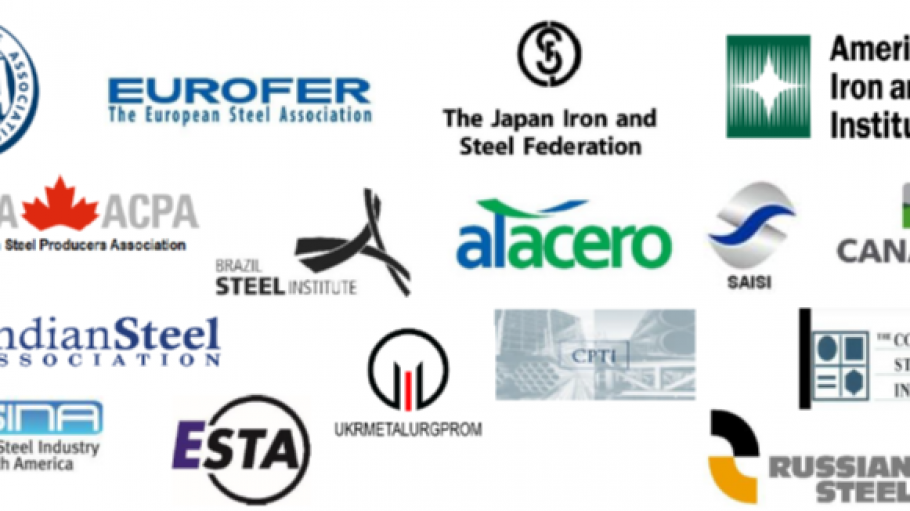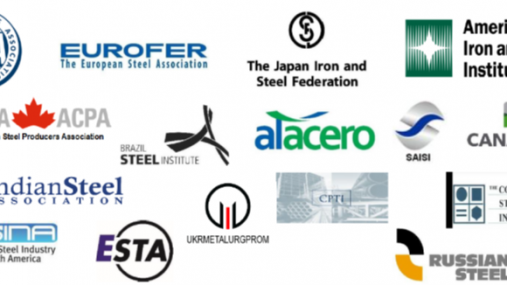
Press releases » 16 steel industry groups welcome agreement to continue international work to reduce global steel overcapacity
16 steel industry groups welcome agreement to continue international work to reduce global steel overcapacity
Downloads and links
Recent updates

Tokyo, October 31, 2019 – Sixteen steel industry associations on five continents today praised the agreement by a “large majority of members of the Global Forum on Steel Excess Capacity (GFSEC)” to “continue the Forum’s work on the issue of steel excess capacity,” and called upon the few dissenting members to reconsider their current position as quickly as possible. Their comments were made at the conclusion of working group and ministerial meetings of the GFSEC in Tokyo last week.
“According to the latest OECD information, there are 440 million metric tons of steel excess capacity in the world today. This is an increase of 6.5 percent over last year,” the groups stated. “Governments of steelmaking economies worldwide must redouble their efforts to address this persistent global excess capacity in the steel sector, eliminating the support measures that cause it, and implementing strong rules and remedies that reduce excess capacity. We call on governments to continue the work on the issue of steel excess capacity without delay.”
“We appreciate the leadership of the Government of Japan in the past year to make meaningful progress in the Forum, and its conclusions as Chair. Recognizing the severe impacts that global steel overcapacity and market distorting policies in the steel sector around the world are continuing to have on our industry, we have urged the continuation of the work of the Forum to ensure its recommendations are turned into action. We are pleased that it is the will of a large majority of members to pursue meaningful efforts on the issue of steel excess capacity on the same basis as the work of the Forum over the past three years,” the group concluded.
The steel industry groups issuing the call for urgent action include representatives of: Steel Manufacturers Association (SMA), American Iron and Steel Institute (AISI), EUROFER (the European Steel Association), Canadian Steel Producers Association (CSPA), CANACERO (the Mexican Steel Association), Alacero (the Latin American Steel Association), Brazil Steel Institute, The Japan Iron and Steel Federation (JISF), European Steel Tube Association (ESTA), Specialty Steel Industry of North America (SSINA), South African Iron and Steel Institute (SAISI), The Cold Finished Steel Bar Institute (CFSBI), Indian Steel Association, Association of Enterprises UKRMETALURGPROM (Ukraine), Russian Steel Association and The Committee on Pipe and Tube Imports (CPTI).
***
Contacts:
SMA – Phil Bell, bell@steelnet.org, 202.296.1515
AISI – Lisa Harrison, lharrison@steel.org, 202.452.7115
CSPA – Catherine Cobden, c.cobden@canadiansteel.ca, 613.238.6049
CANACERO – Salvador Quesada, squesada@canacero.mx, 52 (55) 5448-8162
EUROFER – Charles de Lusignan, charles@eurofer.be, 0032 2738 79 35
Alacero – Fernanda Valente, fevalente@alacero.org, (55 11) 3195-5803
Brazil Steel Institute – Débora Oliveira, debora.oliveira@acobrasil.org.br, 55 (21) 3445-6327 |6300
JISF – Shigeru Hagiuda, hagiuda@jisf.or.jp, 81 3 3669 4835
CFSBI – Mark Redding, mredding@bargrind.com, 630.868.1234
ESTA – Dominique Richardot, esta.dr@orange.fr, 33 1 41 31 56 45
SAISI – Charles Dednam, charles@saisi.org, 27 12 380 0900 SSINA – Larry Lasoff, LLasoff@kelleydrye.com, 202.342.8530
CPTI – Tamara Browne, tbrowne@schagrinassociates.com, 202.223.1700
Indian Steel Association – Arnab Kumar Hazra, a.hazra@indsteel.org, 919958599032
Ukrmetalurgprom (Ukraine) – Oleksandr Kalenkov, office@ukrmetprom.org,0442790525
Russian Steel – Maria Simonova, info@russtal.ru, 79153226225

Download files or visit links related to this content
Strasbourg, 17 December 2025 – The European Commission’s latest proposals on the Carbon Border Adjustment Mechanism (CBAM), unveiled today, correctly identify several loopholes that risk undermining its effectiveness, notably regarding EU exports, downstream sectors and circumvention practices. However, despite these laudable efforts, the measures put forward fail to deliver a comprehensive and durable response to carbon and jobs leakage, warns the European Steel Association (EUROFER).
A milestone occasion to quickly and effectively restore affordable electricity, to relaunch the
decarbonization and strengthen the international competitiveness of the European steel
industry.
Brussels, 02 December 2025 – Unchanged negative conditions – U.S. tariffs and trade disruptions, economic and geopolitical tensions, protracted weak demand and still high energy prices – continue to weigh on the European steel market. EUROFER’s latest Economic and Steel Market Outlook confirms for 2025 another recession in both apparent steel consumption (-0.2%, unchanged) and steel-using sectors (-0.5%, revised from -0.7%). A potential recovery is expected only in 2026 for the Steel Weighted Industrial Production index (SWIP) (+1.8%, stable) and for apparent steel consumption (+3%, slightly revised from +3.1%) – although consumption volumes would still remain well below pre-pandemic levels. Steel imports retained historically high shares (27%), while exports plummeted (-9%) in the first eight months of 2025.